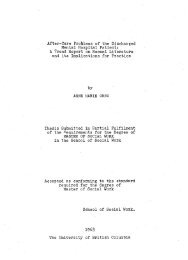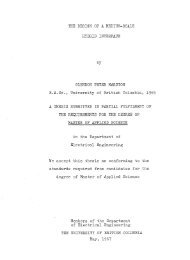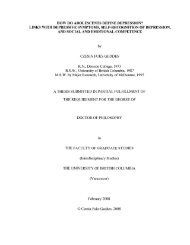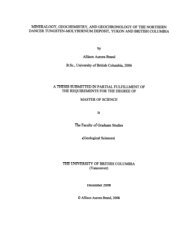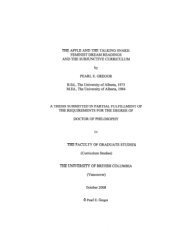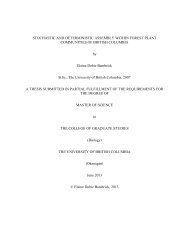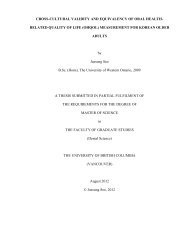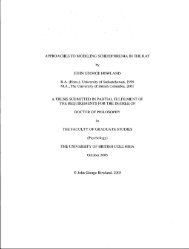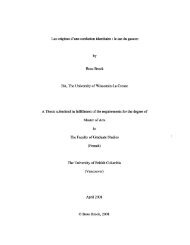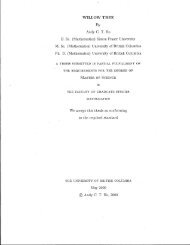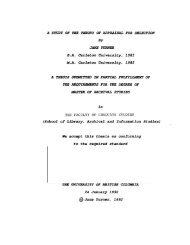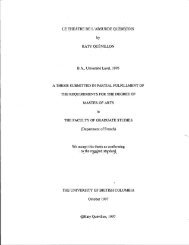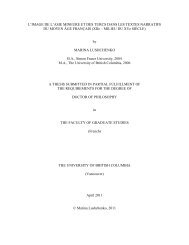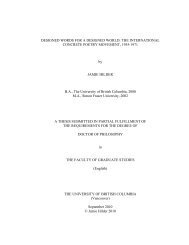The 1536 Dissolution of the Lesser Monasteries: Same Suppression ...
The 1536 Dissolution of the Lesser Monasteries: Same Suppression ...
The 1536 Dissolution of the Lesser Monasteries: Same Suppression ...
You also want an ePaper? Increase the reach of your titles
YUMPU automatically turns print PDFs into web optimized ePapers that Google loves.
Much <strong>of</strong> <strong>the</strong> act deals with <strong>the</strong> suppressed lands and what was to happen with <strong>the</strong> lands<br />
and <strong>the</strong>ir resources. All lands and resources connected to <strong>the</strong> suppressed monasteries were to be<br />
transferred to <strong>the</strong> King, or any person who received <strong>the</strong> King‘s grants <strong>of</strong> <strong>the</strong> lands. Those who<br />
have ―lately fraudulently and craftily made fe<strong>of</strong>fments, estates, gifts, grants, and leases, under<br />
<strong>the</strong>ir convent seals...shall be utterly void and <strong>of</strong> none effect,‖ and <strong>the</strong> King gets full use <strong>of</strong> <strong>the</strong><br />
ornaments, jewels, goods, chattels, and debts <strong>of</strong> <strong>the</strong> governors <strong>of</strong> each monastery. 22 Those with<br />
leases were not affected by <strong>the</strong> act, and were allowed to carry on as if <strong>the</strong> Act had never been<br />
passed. <strong>The</strong> tax <strong>of</strong> first fruits was discharged, and <strong>the</strong> value <strong>of</strong> <strong>the</strong> monasteries was to be<br />
ascertained by <strong>the</strong> Exchequer. Fur<strong>the</strong>rmore, all debts owing by <strong>the</strong> house were to be paid by <strong>the</strong><br />
king in ―as large and ample manner as <strong>the</strong> said chief governors should or ought to have done if<br />
this Act had never been made.‖ 23 Paying <strong>of</strong>f ano<strong>the</strong>r‘s debts in full seems to be a bold move were<br />
<strong>the</strong> king principally after money.<br />
<strong>The</strong> remainder <strong>of</strong> <strong>the</strong> act deals with <strong>the</strong> religious. To begin, <strong>the</strong> heads <strong>of</strong> houses were to<br />
be provided with a pension, which would not have been a financial benefit to Henry. Next, those<br />
religious who wished to leave <strong>the</strong>ir orders would be provided with capacities ―if <strong>the</strong>y will to live<br />
honestly and virtuously abroad, and some convenient charity disposed to <strong>the</strong>m toward <strong>the</strong>ir<br />
living.‖ 24 <strong>The</strong>se capacities were to be granted by <strong>the</strong> royal authority through <strong>the</strong> Faculty Office,<br />
set up at Lambeth Place in 1534. 25 For those religious who wished to remain in <strong>the</strong>ir orders, <strong>the</strong>y<br />
were to ―be committed to such honourable great monasteries <strong>of</strong> this realm wherein good religion<br />
is observed.‖ 26 If monasteries needed reform because <strong>the</strong>y were simply too small, <strong>the</strong>n <strong>the</strong>se<br />
22 Ibid.<br />
23 Ibid, 576.<br />
24 Ibid.<br />
25 Donald F. Logan, ―Departure from <strong>the</strong> Religious Life During <strong>the</strong> Royal Visitation <strong>of</strong> <strong>the</strong> <strong>Monasteries</strong>, 1535-<br />
<strong>1536</strong>,‖ in <strong>The</strong> Religious Orders in Pre-Reformation England, ed. James G. Clark (Suffolk: Boydell Press, 2002),<br />
214.<br />
26 27 Hen. VIII c. 28, 576.<br />
27



